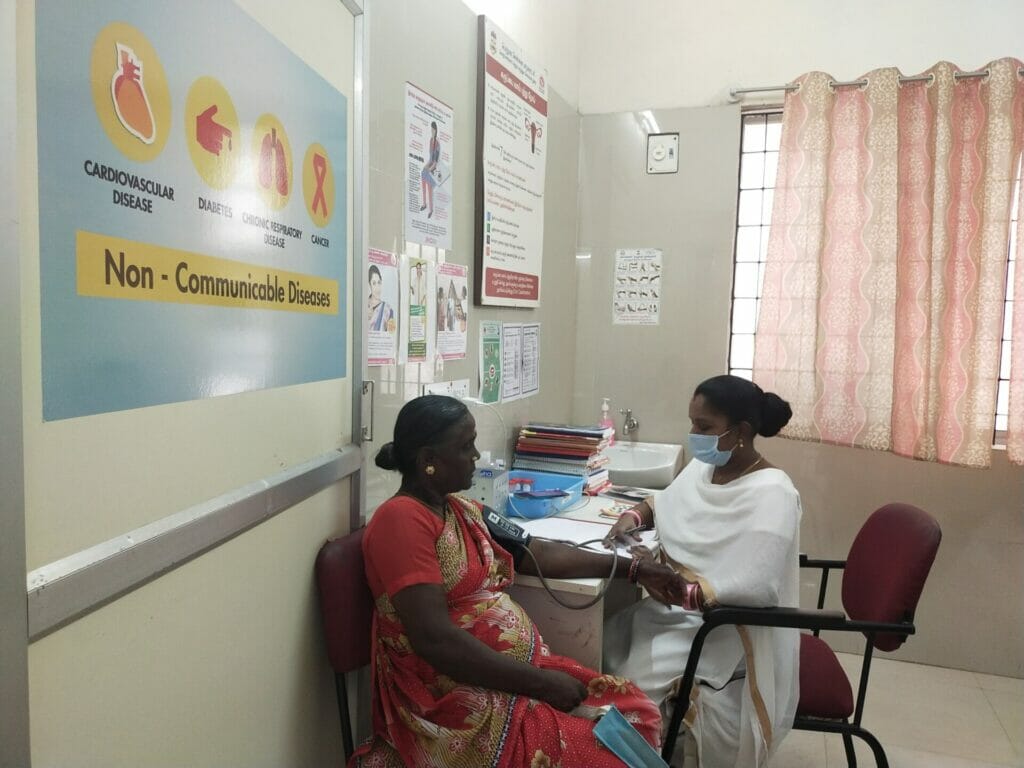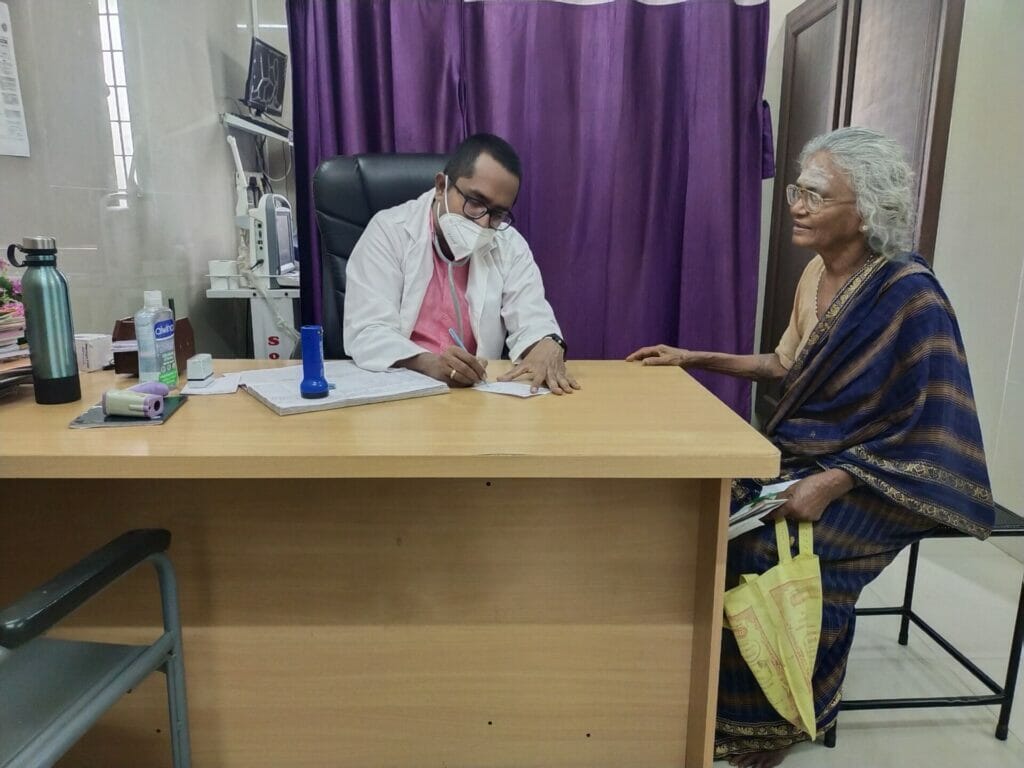It is a balmy Wednesday morning. Having arranged the chairs in rows and set the required vaccines ready on a wooden table, Selvi G, the Urban Health Nurse (UHN) of Valasaravakkam Urban Primary Health Centre (UPHC) in Chennai, awaits mothers scheduled to come in for the immunisation of their children.
As the first of them arrive, Selvi gives them a heads-up that it is only normal for the child to cry after the injection and there is nothing to panic about. She tells them not to rub the injected area and to administer the medicine which will be given to the child in case of fever.
Selvi then collects the Mother-Child Protection (MCP) Card, which has the immunisation schedule for the child and calls out the names one by one. When the mother brings the child, she checks the child for any visible issues and then administers the vaccine.
Soon, the room is filled with slightly disgruntled infants and their mothers comforting them. After 30 minutes of monitoring, the MCP cards are returned to the parent and they are free to go.
This is a regular morning for Selvi, who is entrusted with carrying out the immunisation programme, running the antenatal clinics and monitoring the Auxiliary Nurse Midwives (ANMs) at the Urban Primary Health Centre.
Read more: Dengue in the time of COVID: Stiff challenge ahead for Chennai’s civic and health workers
UPHCs serve pregnant women and young mothers
Pregnant women and young mothers are a majority of the demographic avail of the services at primary health centres in Chennai. The UHNs and the ANMs also play a huge role in taking the services offered to their doorstep. They are on regular field visits to monitor pregnant women and young mothers to ensure they are given nutrition kits and other government benefits on time. They also educate the expectant mothers on dos and don’ts during pregnancy.
Talking to a few of the visiting mothers illuminated how crucial UPHCs in Chennai have been for their well-being.
N Ranjitha, the 28-year-old mother of an 18-month-old child, says that she has been consulting with the doctor at the UPHC in Valasaravakkam since the time of her pregnancy. “The ANMs keep in regular touch with the pregnant women in the locality and have also created a WhatsApp group to post important updates and create awareness on breastfeeding and other such information. They provided us with the required medicines,” she says.
She adds, “During the delivery, I was not forced to undergo a caesarian at the Urban Community Health Centre (UCHC) where I was sent on referral. Once the child is born, we as parents are not aware of the various vaccine requirements. But, at the UPHC, the doctors and the nurses follow the government protocol and help us understand why a particular vaccine is important.”
R Anitha, a young mother from Alwar Thirunagar, was at the UPHC in Valasaravakkam for the first time. “We took the first two doses of vaccines for my child from a private hospital spending thousands of rupees and getting confused with the range of options. My neighbour said that the immunisation programme of the government-run UPHCs was always better and safe,” she says. “I am satisfied with the service. The primary health centre was maintained much cleaner than I expected it to be.”
Outpatient treatment and medical camps
While the immunisation programme takes place in the open hall on the first floor, consultation and treatment for the outpatients are carried out on the ground floor from 8 am.
The footfall started picking up after 9 am and reduced considerably after 11.30 am. On a given day, as many as 180 outpatients visit this UPHC on average.

C Radha, who sells fish in CD Nagar, is at the UPHC waiting to take post-breakfast samples to test the blood sugar levels. She is both diabetic and hypertensive. “I come here once every two months to get checked and collect my regular medicines. I fainted during work one day and came to this UPHC to get checked. Only then did I know that I was diabetic and hypertensive. They registered my details and have been regularly following up since then. If I had gone to a private clinic, they would have treated me on the given day but I do not think that they would have followed up to keep a tab on me on a regular basis,” says Radha.
She adds that she has to spend at least half a day during her bimonthly check-ups at the UPHC. “I lose half a day’s income whenever I come here but the treatment and medicines are provided free of cost and the healthcare workers here look after the patients with care,” she notes.
Dr Arularasan, the medical officer of the UPHC, says that the primary health centre is well-equipped to cater to outpatients. The centre also has screening facilities for tuberculosis (TB), and cervical and breast cancer.
“All essential drugs are always in stock and we only prescribe the medicines that are necessary. While screening can be done here, the patient diagnosed with TB, leprosy or cancer will have to undergo treatment at the tertiary healthcare facilities. They can pick up medicines from the UPHCs. Based on the needs of the patients, we also ensure medicines other than the essential drugs are made available on special request,” he says.
Many UPHCs in Chennai also provides dental care services, which many among the general public are unaware of.
Dr A Darani, the dentist at the UPHC, says that among the patients who visit for dental care, many come with complaints of dental abscess. The UPHC has facilities to treat such cases and perform extractions if needed but any complications beyond that would require a referral to the UCHC.
Since many children who have cavities but refuse to visit the doctor, Dr Darani, in her personal capacity, also hands out some colourful cartoon erasers and other such stationeries to ensure that the children come for follow-up visits.

After the outpatient consultation, Dr Arularasan usually heads out for medical camps arranged in the community. “The camps are arranged based on the community needs. Recently, the local councillor requested we set up a health camp for construction workers. Since they leave for work at 8 am, the camp was arranged from 6.30 am to 8 am,” he notes.
Read more: Dos and don’ts during Madras Eye season
Community outreach programmes run by the UPHCs in Chennai
Apart from antenatal and postnatal care, the UPHC staff are also involved in community outreach programmes.
“Immunisation programmes of Diphtheria-Pertussis-Tetanus (DPT) vaccines are held at the government and government-aided schools in addition to regular health awareness programmes and supply of sanitary napkins for the school and college (1st year) students,” says Arularasan.
“Be it COVID-19, Malaria or Dengue, the UPHCs serve as the main point of contact for early detection and help in taking the necessary preventive measures,” says Dr N Boopesh, the Zonal Health Officer of Greater Chennai Corporation. “For instance, if a malaria case is reported in a particular area, the respective sanitary officer with the help of domestic breeding checkers (DBC workers) conducts inspections in all households in the given area. During such inspections, the sanitary officers will report to the UPHC if they come across symptomatic residents. At such an early stage, we will be able to easily treat the patients at the UPHC level,” he says.
However, from his experience, he notes, “In case of dengue, the patients do not come to the UPHCs when the symptoms begin. Rather, they come when the complications increase. According to the protocol, all we can do is provide basic treatment and refer them to secondary or tertiary healthcare facilities. This makes the patients feel like we do not provide adequate treatment but in reality, UPHCs are not designed to help when they visit after the illness has reached a serious stage.”
Dr Arularasan says that the UPHC staff and the volunteers deployed by the GCC played a crucial role in bringing down the COVID-19 cases through door-to-door checks, which not only helped in early detection but also prevented further health complications and fatalities due to COVID-19.
Read more: Fever survey volunteers play a huge role in COVID control. What’s bothering them?
Better staffing can sustain post-pandemic popularity of UPHCs in Chennai
The Valasaravakkam UPHC has one medical officer, one dentist, one UHN, three staff nurses, four ANMs and two office assistants. Since the designated posts of one sector health nurse (SHN), who has to look after the in-house reports and is next line to the medical officer in terms of herirachy, and 2 ANMs are vacant, the additional work has had to be borne by the UHN.
“Filing the vacancies would help in reducing the workload and provide better healthcare for the public,” notes Selvi.
“We care for the patients. We do not have any other intention but to ensure quality healthcare service is provided to them and they are healthy in the long run,” say the staff of the UPHC on being quizzed why they would like more of the general public to visit the centres for treatment.
Dr Arularasan shares his observation that the perception of government hospitals has changed among the public, particularly post-pandemic, as they have witnessed the services provided there.
“We have seen financially well-off patients coming here for routine checkups after the pandemic. They have started realising that there is no compromise in the quality of service,” he notes.
The UPHCs render crucial service for the local community and those who would otherwise be unable to afford quality or timely medical care in the city. Even as the staff’s hard work during the pandemic has received widespread appreaciation more must be done to support them. Additionally, improving the awareness about the facilities at the UPHCs among the general public can also increase the footfall and benefit Chennaiites from all walks of life.